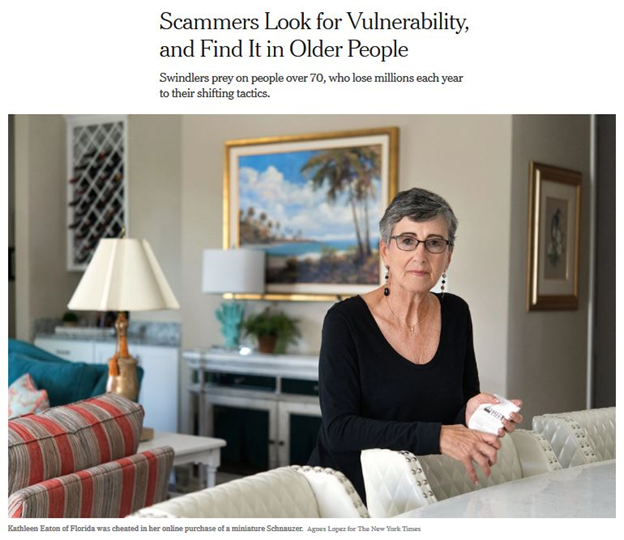Originally published 9/22/2019
Swindlers prey on people over 70, who lose millions each year to their shifting tactics.
In March the Department of Justice described criminal cases involving nearly $700 million lost in the previous year by about two million people. The ones hit hardest by this kind of fraud are over 70, and they experience an average loss of $41,800, the Consumer Financial Protection Bureau reports.
In other instances, people have no idea that anything is amiss until a collection agency calls to tell them a payment is delinquent. “That’s when they discover that their credit card or Social Security number has been stolen,” Ms. Chavez said.
Pay for everything using your credit card. If you fall for a scam, remember that you can dispute the charge with your credit card company and that they can reverse the charges.
So, pay with credit card, keep all your correspondence in writing and, if needed, dispute the charges with your credit card company.
Besides the pet scam, some of the newer tactics for defrauding older people focus on Social Security, grandparenting and employment searches.
Since 2014, nearly 1.3 million reports have been filed with the Federal Trade Commission about callers pretending to be from the Social Security Administration, Health and Human Services, the Internal Revenue Service, the police or the F.B.I., according to a commission report in July.
Deceptive callers might tell victims that their Social Security numbers had been suspended, or that they owed back taxes and must pay immediately or face jail time. Usually, they require cash or a prepaid gift card as payment.
Similarly, with the grandparent scam, the victim receives a phone call or email from a “grandchild” who has been in an accident or is in trouble with the law and needs money — typically gift cards or cash sent through Western Union.
Another report from the Federal Trade Commission noted that last year, people of all ages reported median individual losses of $2,000 to these sorts of “family and friend impostors.”
But for people over 70, the figure was $9,000.
Fraud capitalizing on natural disasters is also rampant among older people, who may be barraged with requests to donate or to hand over financial information to fake charities. Many of the supposed charities have names similar to existing ones, or phone numbers with Washington’s 202 area code. Or they might say they are working with the I.R.S. to help victims get tax refunds or file claims.


